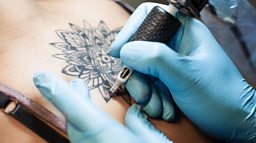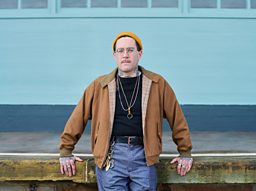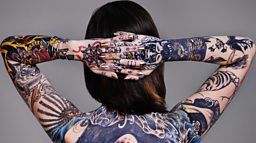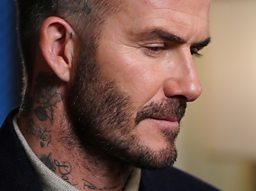Are visible tattoos acceptable in the workplace?
A recent YouGov study found that 63% of those asked would consider face and neck tattoos to be unprofessional.
5 Live’s Nihal Arthanayake has been talking to historians, tattoo artists and listeners about their opinions on face, neck or hand tattoos.
‘We live in a world where we’re represented to the world as little avatars’

Dr Matt Lodder is a historian of tattooing, and a senior lecturer in art history and theory at the University of Essex and believes it would have been impossible for him to have his job if he wasn’t visibly tattooed.
Matt started getting tattooed in his late teens, but only got his first visible ink after he got his PHD in tattooing, he decided to get his first visible tattoo.
“For me it was a very important signal about, the kind of career I was going into,” he says.
“When I got my job at the University of Essex, about 10, 12 years ago, my dad said: ‘Oh, I think I was wrong son, you probably wouldn’t have got this job if you didn’t have tattoos on your hands’.
“The idea of the professional workplace, although that’s changing, one of the reasons why tattooing is so much more visible now than ever, is that people are rolling up their sleeves up at work.”
“Even in the military, which has a long tradition of tattooed people in it, it was until very recently not allowed to have tattoos on the hands or on the neck.”

Speaking about the rise in visible tattoos, Matt believes social media may be a motivator for people getting inked.
“We live in a world where we’re represented to the world as little avatars, little pictures of our faces on social media and on WhatsApp,” he says.
“If you want to present to the world as a tattooed person, tattooed faces are your first option I suppose.”
“The idea that tattooing is newly fashionable is something which I push against as a historian.
“The media have been telling us that tattoos are acceptable and that everyone is getting them now for a very long time.
“Although the uptake of facial and hand tattooing is something very recent… for a long-time tattoo artists in this country would refuse to tattoo people’s hands and faces unless they were already heavily tattooed.
“Facial tattoos in particular are associated in our culture of imagination with ‘savagery’ and with ‘barbarism’.
“That’s why people who know what they’re doing [by getting a face tattoo], do it. They want to sort of make a statement and reject the norms of a polite society.”
‘There is still a certain amount of stigma’

Krissie Langley is a tattoo artist based in Sheffield who takes care to explain to her customers what impact hand and neck tattoos could have on their future jobs.
“Some of them haven’t thought about it until I said it. They just want to look cool; they want to impress people,” she says.
“As much as tattooing is getting more accepted, there is still a certain amount of stigma.
“It’s all very well following your favourite rapper or favourite singer, but unless you're going to be a rapper, a singer or a tattooist, you probably will hit these problems.”

Krissie says she “puts off a good 95% of people” when she explains the possible issues with having a visible tattoo.
“This is how I earn my living, but I also want to sleep at night. I do like to point out to people that this could affect their life,” she says.
Some of her customers have even called her back thanking her for putting them off from having a visible tattoo.
“I’ve had people six months, 12 months down the line ringing me back and saying, ‘I want to thank you for putting me off because the job I have now, I’d have not gotten if I would have had that tattoo done’.”
Krissie adds: “If you know you’re going into a job that is accepting it, then it’s good. But at 18, how many of us know what we want to do forever?”
When asked if tattoos have become more fashionable, Krissie says there are “probably more people with tattoos than without nowadays”.
She says a lot of her customers are middle-aged and older women coming in for “tattoos that they probably wanted 20 years ago”.

5 Live listener John from Middlesbrough has an 18-year-old son, who recently got his first tattoo.
“I felt really proud when he did it. All his mates are getting tattoos, I think it looks great,” John says.
But John says he did encourage his son not to get a tattoo that goes above the neck as he wants him to be able to get a job.
“Maybe a couple of generations from now, we’ll have a prime minister whose got tattoos all over his arms and neck, but I don’t think we’re quite ready for it yet,” he says.
5 Live listeners also got in touch with their opinions
Chris from Nottingham says he and his wife are “heavily tattooed with hand, face and neck tattoos”.
“She works in construction; I work at the Royal Mail.,” he says. “I don’t think it’s a big deal anymore if you’re good at the job you’re doing.”
Lee, 25, contacted the station to say he has hand tattoos and it “truly affected me getting some jobs”.
“But I believe people shouldn’t be so judgemental on tattoos. It doesn’t change who someone is as a person.”
Emma from Leeds has one large tattoo on her back and a number of smaller ones across her body.
“Seven years ago, I decided to get a visible forearm tattoo and often I feel I should cover it up in different circumstances,” she says.
“My best friend is covered in tattoos, but I have to say, I worry if I see face tattoos. It just screams mental health issues.”
